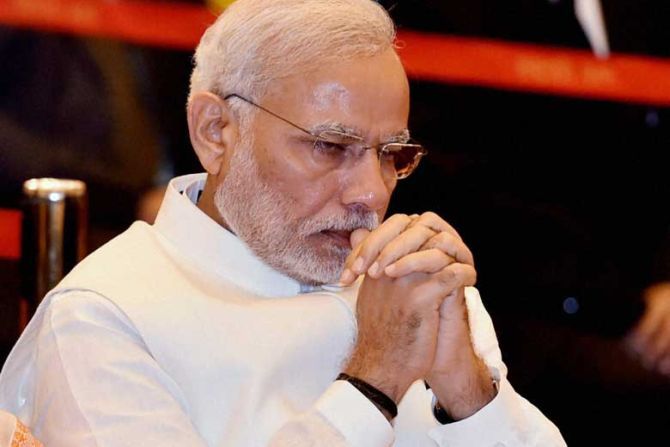Modi must avoid any relaxation in the government’s fiscal consolidation efforts.
Not only should the next government stick to the deficit target of 3.4 per cent of GDP for 2019-20, it should also aim at lowering the deficit even further by striving hard to cut revenue expenditure and improving tax administration and compliance.
A strong resolve on fiscal consolidation is necessary as there will be a huge demand on the government to increase spending with the objective of boosting growth, says A K Bhattacharya.

Expectations from the next government at the Centre have run very high.
A rise of almost four per cent in the benchmark stock indices on Monday is an indication of the high hopes the markets have reposed in the new government.
The stock rally is perhaps also a signal of the markets’ sense of relief that the next government will be stable and not suffer from the weaknesses associated with alliances.
In such a situation, it is incumbent on those who will form the next government to be mindful of what they need to focus on and what they need to avoid.
Here is an attempt to outline one opportunity the new government should grab and one pitfall they should avoid at any cost.
First, the pitfall that the new government must avoid.
The Centre’s fiscal consolidation efforts between 2014 and 2019 have been one of the highlights of Mr Modi’s first five-year tenure.
These could have been better, but bringing down the government’s fiscal deficit from 4.5 per cent of gross domestic product (GDP) in 2013-14 to 3.4 per cent of GDP in 2018-19 shows a steady improvement even though the pace of correction slowed down considerably after 2017-18.
Critics will also point out that the quality of fiscal deficit reduction has been suspect, but the overall trend has been reassuring.
What Mr Modi must avoid in his second five-year tenure is any relaxation in the government’s fiscal consolidation efforts.
The goal of reducing the fiscal deficit to 3 per cent of GDP by 2020-21 must be achieved without any pause in between as had been applied on more than one occasion not just in the last five years, but also during the previous government’s tenure.
In July 2014, Finance Minister Arun Jaitley had the option of junking the fiscal deficit target of 4.1 per cent of GDP set in the interim Budget that the Manmohan Singh government had presented earlier in February 2014.
He could have blamed the previous government and its unrealistically ambitious deficit target and given himself room for some more expenditure.
But Mr Jaitley avoided that path and instead accepted the difficult challenge of sticking to the target set by his predecessor from a different government.
That set the momentum and direction of the Modi government’s fiscal consolidation efforts.
Now, in 2019, there is even greater need for fiscal consolidation.
Not only should the next government stick to the deficit target of 3.4 per cent of GDP for 2019-20, as set in the interim Budget presented earlier in February, it should also aim at lowering the deficit even further by striving hard to cut revenue expenditure and improving tax administration and compliance.
More importantly, it should set a clear and realistic timetable for achieving the desirable goal of three per cent deficit by next year.
A strong resolve on fiscal consolidation is necessary as there will be a huge demand on the government to increase spending with the objective of boosting growth.
True, there is need for more investment to counter forces of an impending economic slowdown.
But there are two dangers in adopting such a strategy.
One, the government in the name of increasing expenditure may actually give a fillip to wasteful, inefficient and poorly targeted spending like that on subsidies and doles.
Two, an increase in expenditure will mean higher government borrowing.
This will crowd out the private sector from the borrowing market and even push up interest rates.
Both the dangers are avoidable.
The new government must also recognise that already the revenue numbers in the interim Budget for 2019-20 project highly ambitious growth rates.
After taking into account the shortfall in revenue collections in 2018-19, corporation tax collections in 2019-20 are expected to grow by 15 per cent (they grew at the same rate in 2018-19) and personal income-tax collections are set to grow by 32 per cent, compared to a growth rate of just nine per cent in 2018-19.
GST collections are expected to grow by 18 per cent. These revenue numbers will be extremely challenging targets to meet as the Indian economy faces a slowdown.
Planning an expenditure binge, at the cost of fiscal consolidation, will also be dangerous.
It’s true that the government’s total capital expenditure (including internal and extra budgetary resources for public sector undertakings and Indian Railways) for 2019-20 will see a small decline at Rs 9.54 trillion, compared to Rs 9.61 trillion in 2018-19.
The government’s capital expenditure should ideally increase, but this option can be looked at only when various other types of revenue expenditure are cut substantially to prevent any further slippage in the deficit.
What about the opportunity that the new government must grab in the next few months?
It must take up the public sector reform agenda in earnest.
Public sector reforms do not just mean divestment of government equity in state-owned enterprises, but should include privatisation of non-strategic public sector undertakings (PSU), closure of the unviable loss-making ones and merger of more public sector banks.
The list of PSUs that should be either closed down or privatised is already with the NITI Aayog.
The next round of PSU bank merger brooks no further delay.
A new government can take such steps more easily in the first few months of its tenure.
The next round of state Assembly elections will not take place before September 2019.
It will not be under any political pressure at least for the next four months.
It will be an opportunity that the new government should grab without fail.
Photograph: PTI Photo












 © 2025
© 2025